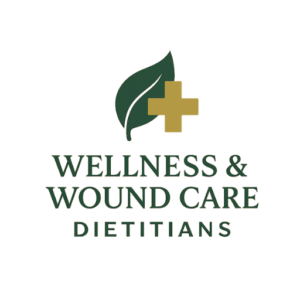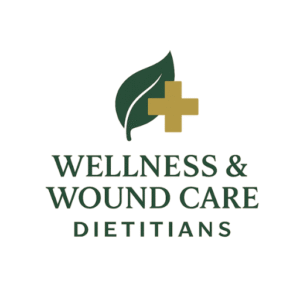Providers
Why Refer Your Patients to a Registered Dietitian?
Refer Your Patient in Under 60 Seconds.
Partner with Wellness & Wound Care Dietitians to support your patients’ recovery through evidence-based nutrition care. Our registered dietitians specialize in wound healing, chronic disease management, and overall wellness — complementing your treatment plan and improving outcomes.
Fast Referral Process – Submit a referral form in less than a minute.
Insurance-Friendly – Most patients pay $0 out of pocket.
Specialized Care – Focused on wound healing, malnutrition, diabetes, and recovery nutrition.
Seamless Collaboration – We coordinate directly with your care team to support continuity of care.
Optimize Healing – Improve time to wound closure and healing rates for better Care Compare ratings and patient satisfaction.
How It Works?
Complete our quick referral form online.
We verify insurance coverage within 24–48 hours.
Your patient is connected to a wound care dietitian for personalized nutrition counseling.
Partner With Us to Enhance Your Wound Care Services
At Wellness & Wound Care Dietitians, our primary focus is supporting patients with acute and chronic wounds through comprehensive, individualized nutrition counseling. We partner with your wound care team to deliver evidence-based nutrition interventions that accelerate healing, reduce complications, and treat the whole patient.
How We Complement Your Wound Care Interventions?
While you provide direct wound care interventions, our Registered Dietitians (RDs) enhance recovery by optimizing your patients’ nutrition to improve tissue repair, immune defense, and overall outcomes.
We specialize in providing your patients with evidence-based nutrition counseling for:
Arterial ulcers
Venous ulcers
Diabetic lower-extremity ulcers
Non-healing surgical wounds
Traumatic wounds
Atypical wounds
Pressure injuries
Minor burns
Radiation-related wounds
Abdominal stomas
Non-healing wounds of any body part
How We Complement Your Wound Care Interventions
Treating the Whole Patient
Wound healing is impacted by more than the wound itself.
That’s why our dietitians provide comprehensive nutrition consultations to address underlying chronic conditions that can affect healing, such as:
-
Obesity
-
Diabetes
-
Congestive heart failure
-
Hypertension
-
Other nutrition-related chronic diseases
Flexible Collaboration
We tailor our services to your patients’ needs — and to your workflow.
Simply let us know your focus areas, and our team will deliver coordinated nutrition care that strengthens your wound care program.
How We Complement Your Wound Care Interventions?
While you provide direct wound care interventions, our Registered Dietitians (RDs) enhance recovery by optimizing your patients’ nutrition to improve tissue repair, immune defense, and overall outcomes.
We specialize in providing your patients with evidence-based nutrition counseling for:
Arterial ulcers
Venous ulcers
Diabetic lower-extremity ulcers
Non-healing surgical wounds
Traumatic wounds
Atypical wounds
Pressure injuries
Minor burns
Radiation-related wounds
Abdominal stomas
Non-healing wounds of any body part
Why should wound care providers refer patients to a registered dietitian?
1. Nutrition Is a Core Factor in Wound Healing
Wounds cannot heal without adequate nutrients.
Registered Dietitians (RDs) guide patients to consume the right amounts and types of foods rich in nutrients essential for wound healing.
-
Protein is required for tissue synthesis and immune defense.
-
Micronutrients such as vitamin C, vitamin A, and zinc support collagen formation and immune response.
-
Energy (calories) ensures protein is used for healing, not burned for fuel.
-
Malnutrition is strongly associated with delayed healing, increased infection risk, and higher rates of wound recurrence.
2. Dietitians Provide Comprehensive Assessment
- RDs conduct a complete nutrition assessment to detect deficiencies that may delay healing.
- They guide patients to consume adequate amounts of protein and calories to optimize the body’s healing capacity.
3. Tailored Interventions Improve Outcomes
RDs translate scientific evidence into individualized meal plans by:
-
Adjusting protein intake to support wound repair
-
Providing nutritional guidance for managing diabetes, obesity, and other chronic diseases
-
Recommending wound-specific nutrition supplements rich in arginine, glutamine, HMB, and other ingredients proven to accelerate healing
4. RDs Reduce Healthcare Costs and Complications
Nutrition interventions have been shown to:
-
Lower hospital length of stay
-
Reduce infection and readmission rates
-
Decrease the incidence and severity of pressure injuries
These improvements strengthen quality measures (e.g., Hospital-Acquired Pressure Injuries, malnutrition risk, and other eCQMs), reduce costs and penalties, and enhance overall patient satisfaction.
5. Multidisciplinary Team Integration
- Wound care is not just topical — success depends on treating the patient from the inside out.
- Unity creates the power to heal.
Including RDs in wound care fosters collaboration among physicians, surgeons, nurses, podiatrists, and physical therapists to ensure whole-patient care. - RDs bring specialized nutrition expertise that complements other clinicians’ work — filling critical gaps in care to promote faster, more efficient healing.
6. Evidence-Based Support
-
Up to 45–60% of wound care patients are malnourished or at risk of malnutrition
-
Patients with early dietitian involvement experience faster healing and fewer complications
-
Professional guidelines, such as those from the National Pressure Injury Advisory Panel (NPIAP), recommend mandatory nutrition assessment and intervention in wound care.

